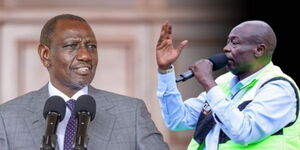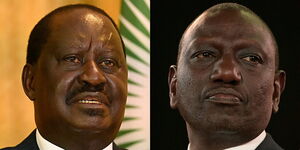Carbon trading is the process of buying and selling permits and credits that gives permit holder the legitimacy to emit carbon dioxide into the airspace.
In return, the money received from this kind of trade is used to compensate people, especially farmers in developing countries who are largely affected by the adverse effects of global warming.
Through various projects and agencies, farmers in the developing world like Kenya are allowed to have access to these funds that are often channeled into environmentally friendly modes of food production.
The world's biggest carbon trading system is the European Union Emissions Trading System (EU ETS).
Kenya farmers stand to benefit greatly from the voluntary carbon trading market that was estimated at $1 billion in 2021 by S&P Global Platts.
“Smallholder farmers can as well earn from the voluntary markets by selling the carbon credits generated from various farming activities. There are organisations that can create a link between the farmers and buyers.
“However, developing countries should come up with regulatory frameworks regarding carbon trading more specifically by regulating the market value for carbon credits and protecting smallholder farmers from exploitation,” explained Kennedy Mugambi Tax Advisor with KPMG.
Kenyan farmers can, therefore, take advantage of the opportunity through designated agencies like Kenya Forest Service (KFS) that is already benefiting from carbon trading in its recent deal with BDO.
The concept of carbon trading came in response to the need for limited allowances for emissions while helping those who are seriously affected by global warming crisis.
The carbon trading bazaars are divided into compliance and voluntary markets.
The major difference between the voluntary carbon market (VCM) and compliance markets is the ability to participate in VCM regardless of the participant’s geographical location or business factor.
Technically, the compliance market is regulated by national and international authorities who determine a cap in the amount certain sectors can release into the environment in order to achieve their Nationally Determined Contributions (NDC) under Article 4 of the Paris Climate Agreement.
“In Kenya, The Rural Electrification and Renewable Energy Corporation (REREC) established under Section 43 of the Energy Act (2019), is tasked with harnessing opportunities offered under clean development mechanism and other mechanisms including carbon credit trading,” explained Kennedy Mugambi.
Section 75 of Kenya Energy Act (2019) further authorises the Cabinet Secretary to collaborate with the necessary stakeholders in harnessing carbon trading opportunities.
However, Kenya still needs to come up with a multifaceted approach with the aim of tapping into the country’s abundant resources to derive economic benefit from the carbon trading market with a long-term goal of eventually establishing a standard inter-governmental carbon compliance market similar to those in developed regions like Europe, America and China.
“If Kenyan farmers take full advantage of carbon trading, the expectation is that their costs of farming will come down and with this, there will be a trickle-down benefit to the rest of the Kenyans through reduced food prices,” explained Kennedy Mugambi Tax Advisor with KPMG.
Global organisations have clearly understood the effects of global warming to their businesses, and how greenhouse gas emissions from our day-to-day human activities do shape the world.
However, it remains the role of authorities to track the carbon footprints for entities and determine if their emissions went beyond the allowable limit.
As a result, entities that go beyond the prescribed amount in carbon emissions have no option but to buy or use saved credits to stay below the emissions limit.
“For proper context, a carbon credit is a tradeable instrument which represents one tonne of carbon dioxide removed from the environment. In the voluntary market, carbon credits trade is on voluntary basis meaning that the participants operate outside the compliance markets.
This provides a flexible trading scheme for players (individuals, businesses, governments and NGOs) to voluntarily offset their emissions by purchasing carbon credits,” Mugambi explained.
While attending COP2027 on November 6, 2022 President Willian Ruto promised to push for more action on climate change in order to save the Kenya from perennial droughts.
Kenyan is currently going through one of the worst droughts ever, in which thousands of animals have died due to lack or pasture and water with millions of people starving.
Ruto is passionately advocating for the implementation of the Paris Agreement adopted by 196 Parties at COP21 in 2015 that undertakes to combat climate change and adapt to its effects.












